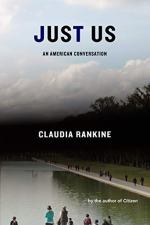|
This section contains 874 words (approx. 3 pages at 400 words per page) |

|
Just Us: An American Conversation Summary & Study Guide Description
Just Us: An American Conversation Summary & Study Guide includes comprehensive information and analysis to help you understand the book. This study guide contains the following sections:
This detailed literature summary also contains Topics for Discussion on Just Us: An American Conversation by Claudia Rankine.
The following version of this book was used to create this study guide: Rankine, Claudia. Just Us: An American Conversation. Minneapolis: Graywolf Press, 2020.
Just Us consists of 21 chapters of distinct essays about racial issues in society and the author's personal life.
It begins with “what if,” a poem about reimagining race relations to pursue a better, more equitable future world.
This is followed by “liminal spaces i,” in which Rankine describes a series of conversations she had with white men in airports and airplanes about their privileged place in society. One man states his belief that his son was not accepted to Yale University because he is white, while another tells Rankine he does not see color, to which she responds, “if you can't see race, you can't see racism” (49)
In “evolution,” Rankine discusses simianization (the racist comparison of black people to apes) and the ineffectiveness of diversity workshops when the workshop facilitators and attendees are not diverse themselves.
In “lemonade,” Rankine writes of the challenges she experiences in her interracial marriage, partly because black women are viewed as socially inferior to white women in the U.S.
The chapter “outstretched” features analysis of a photograph by Paul Graham, which Rankine suggests addresses the low value of black women in American society.
In “daughter,” Rankine recalls attending a parent-teacher conference at her daughter's school and feeling concerned about unconscious racial bias among her predominantly white teachers. She provides research data demonstrating that this bias is a legitimate phenomenon in the U.S. education system.
The chapter “notes on the state of whiteness” features quotes from Thomas Jefferson's 1781 book Notes on the State of Virginia, throughout which Jefferson discusses racial discord and declares that black people are inherently less intelligent than white people.
In “tiki torches,” Rankine recalls a cross-burning incident on her college campus during her freshman year. She asks two white college friends about their memories of this incident and she is frustrated by their responses; one does not remember it at all and the other suggests that perhaps the perpetrators now regret their actions. Rankine believes white and black people view events like these very differently.
The chapter “study on white male privilege” describes an encounter between two police officers at a training seminar about incidents of police violence against transgender people. A white male police officer questions the data presented about this issue and a white female officer states that he is uninformed because of his white male privilege. The female officer received a written reprimand for this comment, while the male officer was not disciplined for being disruptive during the seminar.
In “tall,” Rankine describes an encounter with a white man who told her that he believed his height was his “greatest privilege” (145).
In “social contract,” Rankine recalls a discussion with a group of white people who failed to take into account the role racism played in the 2016 election of Donald Trump to the presidency.
In “violent,” Rankine recalls her friend's four-year-old black son being referred to as “violent” by his white teacher after having a tantrum. She suggests that this is an example of unconscious racial bias and cites studies and historical examples demonstrating that racism in the education system can damage a child's self-esteem and reduce their chances for success in life.
The next chapter, “sound and fury,” features a poem in which Rankine suggests that white people are unwilling to address racism because to do so would be in conflict with their belief in America as a meritocracy.
In “big little lies,” Rankine recalls having a productive conversation about racial differences with a white friend.
In “ethical loneliness,” she recalls attending a play about race relations with another white friend. At the end of the play, a character asked that all of the white people in the audience come on stage, and Rankine's friend refused to do so. Rankine was troubled by this and later asked her friend for an explanation. When the friend stated that she simply did not want to, Rankine felt hurt, though the friend later provided a more thorough response.
In “liminal spaces ii,” Rankine provides transcripts of encounters in which a white person called the police on a black person for frivolous reasons.
In “josé martí,”Rankine recounts a series of conversations she had with a Latinx woman who educated her on racial issues pertaining to this group.
In “boys will be boys,” she recalls the Senate Judiciary hearing held to discuss the appointment of Justice Brett Kavanaugh to the Supreme Court after allegations of sexual assault, and suggests that black boys and men rarely have their mistakes or bad behavior excused as Kavanaugh did.
In “complicit freedoms,” Rankine considers the phenomenon of black women bleaching their hair blond and suggests that doing so could be a form of tacit approval of white supremacist ideology.
This is followed by “whitening,” in which the author discusses the popularity of skin whitening in Asian countries and the lightening of the skin of Japanese-Haitian tennis player Naomi Osaka in media representations.
In “liminal spaces iii,” Rankine wonders how we might collectively move on from our racist history in the United States to pursue racial equity through open dialogue and learn from one another.
Read more from the Study Guide
|
This section contains 874 words (approx. 3 pages at 400 words per page) |

|



